The 24th
LaureateMusic
Philip Glass
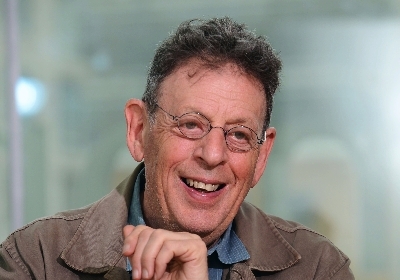
For many,Philip Glass is an icon of contemporary music. His music is often referred to as being part of the “minimal music” movement,though Glass himself prefers to describe it as music based on repetitive structures.
His output is anything but minimal; compositions include what Glass terms as “theater music” for opera,dance and movies as well as classical,pop and rock pieces. His work includes the groundbreaking opera Einstein on the Beach that was premiered in France in 1976 and the music score for the film The Truman Show that won the Golden Globe’s Best Original Score Award.
He learned violin and flute from childhood and studied at the prestigious Juilliard School. In 1965 he met Ravi Shankar a meeting that led him to explore the rhythmic structure of Indian music; structures that have had a lasting influence on his work. In 1968,he formed the Philip Glass Ensemble.
Although he is sometimes regarded as having an uncompromising music style,he engages in positive collaborations with other artists such as Allen Ginsberg and Woody Allen.
In 2005 Cinema synchronized concerts for Quatsi’s Trilogy (1983-2002) were held at Aichi World Expo and other places in Japan to great acclaim,and this year has seen a well received revival of Einstein on the Beach. Practicing tai chi and yoga every day,Glass remains youthfully eager to continue to expand the possibilities of music.
Biography
For many,Philip Glass is an icon of contemporary music. His music is often referred to as being part of the “minimal music” movement,though Glass himself prefers to describe it as music based on repetitive structures.
He says,“The language of music is a continuous exploration into the world that we listen to.” His music,which he calls “theater music,” covers a wide range of genres; opera,symphony,dance,theater and movies. His melodies,imbued with the rhythm structures of Indian music,greatly influenced not only classical music but rock and pop music too.
He learned violin and flute from childhood and entered Chicago University when still only fifteen. After graduating from university,he studied at the prestigious Juilliard School then traveling to Paris where he studied Bach,Mozart and Beethoven under Nadia Boulanger,a tutor to many distinguished musicians. At the same time,he met Ravi Shankar (1997 Praemium Imperiale Laureate).
“I learned how the rhythmic structure of music could determine the overall shape of the music,” he recalls. “I knew for the first time the existence of music made entirely from different approach from the one I had learned.”
He then studied the music of North Africa and India. It is well known that this experience influenced him profoundly both musically and politically. He is a prominent supporter of the cause of the Tibetan refugees and has met the Dalai Lama.
He returned to New York in 1967 and formed the Philip Glass Ensemble,creating a radical sound by adding an electronic piano and several electrically amplified string instruments to complement the traditional ones. Their first performance was One Plus One. In 1976,the groundbreaking opera Einstein on the beach that he co-produced with Robert Wilson,premiered at the Avignon Festival and was highly praised. His music scores for movies are highly acclaimed ― Kundun received the ‘Best Music Score’ Award from Los Angeles Film Critics Association and The Truman Show received the Golden Globe for ‘Best Original Score’.
In 2005 audiences were given the rare opportunity to hear the Cinema synchronized concerts for Quatsi’s Trilogy (1983-2002) at Aichi World Expo and other places in Japan. They were a huge success.
Glass has always passionately pursued the creation of music,driving cabs in New York when young,to earn a living that would allow him to create his own music. This passion has attracted generations of new admirers and although he is sometimes regarded as having an uncompromising music style,he engages in positive collaborations with other artists such as Allen Ginsberg and Woody Allen.
“The problem of artists who have achieved a certain level of success is that they tend to be rather conservative and continue a steady development. They do old pieces in a new way or do new pieces in an old way. To get new inspiration through collaborations is my duty.”
Practicing tai chi and yoga every day,Glass remains youthfully eager to continue to expand the possibilities of music.
Chronology
Met Ravi Shankar in India
-
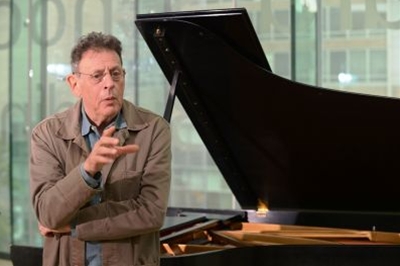
At The Juilliard School
-
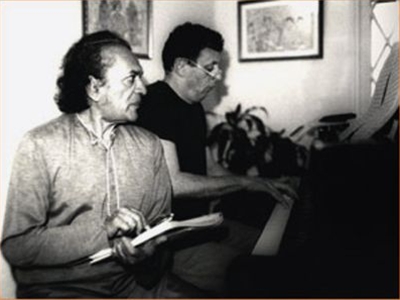
With Ravi Shankar
-
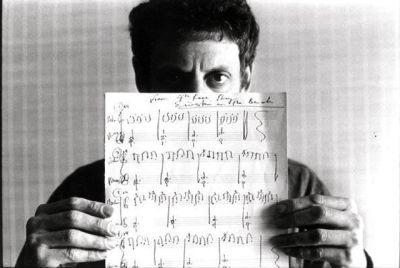
Einstein on the Beach
-
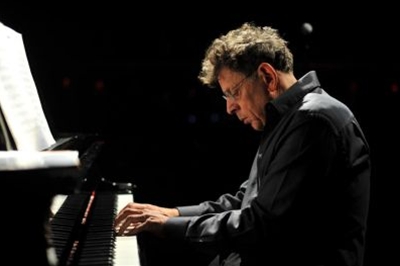
Photo: Fernando Aceves
Courtesy: Pomegranate Arts -
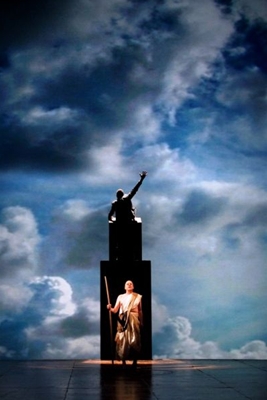
Satyagraha
-
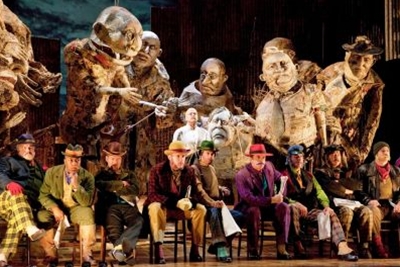
Satyagraha

